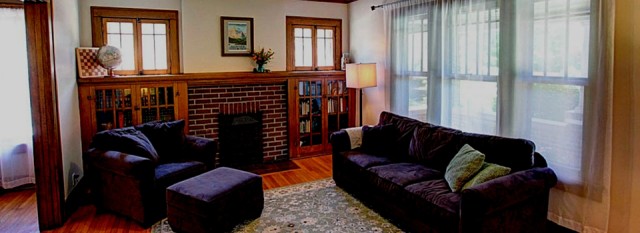I recently wrote about the theology of woodworking, giving a theological case for the joy we have in craftsmanship. Recently, however, I realized a rather grave omission on my part, which I would now like to remedy.
In general terms, my omission had to do with the nature of sin: any theology that leaves sin, death and the devil entirely out of its account is severely lacking. At present, I would like to sketch the counterpart to my earlier post: a theodicy of craftsmanship.
The Back-story
In the summer of 2013 we purchased our first home: a 1917 craftsman style home in Xenia, OH. It was a truly beautiful home with built-in stained glass, double-hung wooden-sash windows, built-in cabinets, brick first story and stucco second story…. From the moment we stepped into that home, it took our breath away. And still does.
But it needed work. Over a two year period (which was also my first two years teaching), we removed the wall paper and painted every room in the house, stripped and painted the sophets, repaired the stucco and repainted the exterior of the house, replaced the roof and gutters, rebuilt the pillars on the front porch, restored all the windows in the house, rebuilt the mud room, finished the basement bathroom, fenced the back part of the property, redid some of the electrical work…and the list goes on. And I’m not sure how we did it, but we had energy and love to burn for our first home.
Theodicy of Craftsmanship

We walked away from it all. Things went badly at my first position as a professor, and the majority of my theology and philosophy colleagues, not to mention much of the administration and the majority of the trustees, were forced to leave. We found ourselves in a precarious position, sure to be forced out of the school soon. We were fortunate enough to secure a position in Biola University’s Torrey Honors Institute, and moved westward. But in doing so we had to walk away from our home.
All the joy, all the creativity, all of our identity that we weave into the objects we create—whether that be a desk or a home—all of it is as pointed for pain as it is for joy, for apart from the Creator himself, any good thing can be used for evil as for good. While the joys of woodworking (and other arts and crafts) are significant, good and enduring, they open us to new and different kinds of pain and suffering.
Whereas the narrator’s (Edward Norton) life in “Fight Club” was an entirely replaceable collection of Ikea items, nothing is replaceable about the home we left behind. Not only is the home unique and our memories tied to that particular place—I wove my identity into that home by getting to know its every nook, cranny, defect and virtue. And it wasn’t just knowledge! By the time we left that home after only two short years, it shone with joy and beauty, for we had brought it to life, giving it a share of the joy we had through our creative work.
The more we gave to that home, the more we wove our joy into it (and vice-versa), the more pain we have in leaving it.
And of course, this pain is just a tithe of the suffering others have experienced, in the host of sufferings that come with this terrain. Fire. Hail. Theft. We weave our character into objects because we, like our God, are creators, and it is right to do this—but it brings us pain.
Hope

Will I buy another home? I long to. And will I throw myself into making it as beautiful and welcoming as I am able? Without a doubt. The reality of pain is no deterrent for the far greater reality of joy. The pain is there, and must be acknowledged. But while crafts make us vulnerable to suffering, hiding from suffering is no solution. We can hide our heart, and lock it away to keep it safe, as C.S. Lewis says in “The Four Loves.” But doing so will only harden our heart, for it lives by loving, amidst the hurt.
Why should we continue to pursue our crafts? Why invite the pain that attends the joys of woodworking? Because it is our nature. And beyond that, there is the hope—the hope of the resurrection. For the same God who loves our bodily existence so much as to make us bodily creatures once more in the new creation, likewise brings back into existence our crafts, along with all other healthy bodily joys. If I will continue as a craftsman to the glory of God in the eschaton, I have every reason to continue in that work now.

